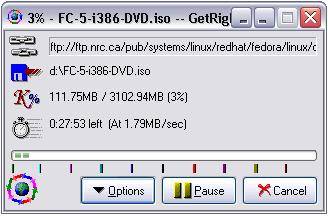Metalink is a
new technology that makes it easier and faster to get large files. It’s kind of
like a playlist for such files (they can be FTP, HTTP, or P2P), because it stores
multiple file locations in a single file – and then the download proceeds according to a
set of rules.

The Wikipedia page for metalink
describes it like this:
“Metalink is an open standard/framework for programs that download (download managers,
BitTorrent clients, Web browsers, FTP clients, & P2P programs). For increased
convenience, it stores the many locations of files (FTP/HTTP/P2P) in a single file (a
.metalink) for extra reliability in case one method fails and so chunks/segments of each
file can be downloaded from multiple resources at the same time (known as
accelerated/multi-threaded/segmented downloading).”
For developers, metalink files are made up of XML and they are extensible. They also
work across multiple operating systems. For ordinary users, metalinks apparently make downloads “simpler, faster, and more
reliable”.

I see metalinks being particularly useful for companies that offer large media
downloads (video, music, etc), and want to make it as fast and efficient as possible for
their customers to download the files. The TorrentFreak blog explain the
benefits well:
“Metalinks have several advantages to individual mirrors. First of all, it speeds up
the download process. Secondly, downloads are more reliable since metalinks use several
mirrors. An additional advantage for the publisher is that he or she is able to
prioritize a source.”
As well as support from
download managers and P2P programs, metalinks would seem to have a promising future
integrated into web browsers. Opera already supports BitTorrent, so metalinks
would be the logical next step. Firefox, IE, Flock, Maxthon and the other browsers would
likewise do well to utilize metalinks, especially with large media files becoming
commonplace on the Web.
Thanks Anthony Bryan from the Metalink org for the heads-up.





















